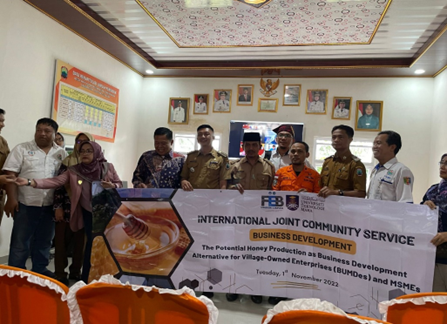The potential of honey production as business development alternative for village owned enterprises and MSMEs
DOI:
https://doi.org/10.22219/jcse.v4i2.25911Keywords:
Business development, Honey production, Business alternative, BUMDesAbstract
Community service is a process of self-empowerment for the benefit of society. This service is based on problems that occur in the community that the potential of existing honey has not been optimized to become a superior product. In addition, honey-producing bee farmers only produce honey in one product, namely real honey. Gradually, this product is certainly less attractive to consumers even though honey production keeps continue. Therefore, it is important to explore new business development alternatives so that farmers can receive more benefits from honey bee cultivation. In this community service activity, the team collaborated with Universiti Teknologi Mara (UiTM) Cawangan Melaka, Malaysia with the title Business Development: Potential for Honey Production as an Alternative for Business Development. The methods used in this service are demonstrations and lectures to the participants. The results of community service carried out in Way Kalam Village, Penengahan District, South Lampung Regency, Lampung Province with speakers from UiTM have proven to be able to increase the ability of bee farmers to carry out honey production to marketing and increase the potential income generated from selling honey.
Downloads
References
Alvarez-Suarez, J. M., Giampieri, F., & Battino, M. (2018). Honey as a source of dietary antioxidants: Structures, bioavailability and evidence of protective effects against human chronic diseases. Current Medicinal Chemistry, 25(38), 4848-4860.
Andri Setiawan, Rudianda Sulaeman, Tuti Arlita. (2016). Strategi pengembangan usaha lebah madu kelompok tani setia jaya di Desa Rambah Jaya Kecamatan Bangun Purba Kabupaten Rokan Hulu. Jom Faperta, (3) 1.
Ariandi, Khaerati. (2017). uji aktivitas enzim diastase, hidroksimetil furfural (hmf hmf), kadar gula pereduksi, dan kadar air pada madu hutan batang. Prosiding Seminar Hasil Penelitian (SNP2M) 2017(pp.1-4). Makassar, 7–8 November 2017: Unit Penelitian dan Pengabdian Kepada Masyarakat Politeknik Negeri Ujung Pandang.
Cahyono, S. W., & Yunanto, A. (2018). peran keahlian dan motivasi kerja terhadap kinerja karyawan BUMDes di Kabupaten Grobogan. Jurnal Ekonomi Pembangunan: Kajian Masalah Ekonomi dan Pembangunan, 19(1), 20-30.
Eteraf-Oskouei, T., & Najafi, M. (2018). Traditional and modern uses of natural honey in human diseases: A review. Iranian Journal of Basic Medical Sciences, 21(6), 558-567.
Gethin, G., & Cowman, S. (2018). Manuka honey vs. hydrogel-a prospective, open label, multicentre, randomised controlled trial to compare desloughing efficacy and healing outcomes in venous ulcers. Journal of Clinical Nursing, 27(5-6), e885-e893.
Hadi, P., & Sarimanah, E. (2018). Peningkatan kesejahteraan masyarakat melalui pengembangan usaha madu di Desa Tenggulunan, Kecamatan Wlingi, Kabupaten Blitar. Agri-Sosioekonomi: Jurnal Ilmiah Sosial Ekonomi Pertanian dan Agribisnis, 14(1), 1-10.
Kementerian PPN/Bappenas. Tujuan pembangunan berkelanjutan poin 12 konsumsi dan produksi yang bertanggung jawab. Diakses melalui https://sdgs.bappenas.go.id/tujuan-12/
Khalil, M. I., Alam, N., & Moniruzzaman, M. (2018). Sulforaphane and epigallocatechin gallate restore the antioxidative properties of commercially available honeys in vitro. Journal of Medicinal Food, 21(3), 271-278.
Khasanah R, Parman S, Suedy SWA. (2017). Kualitas madu lokal dari lima wilayah di Kabupaten Wonosobo. Jurnal Biologi 6(1), hlm 29–37.
Otnmani I, Abdennour C, Dridi A, Kahalerras L, Halima-Salem A. 2019. Characteristics of the bitter and sweethoney from Algeria Mediterranean coast. Veterinary World 12(4), 551–557.
Putra, S. P. E., & Kusuma, A. H. (2018). Kajian pemanfaatan teknologi informasi dalam pengembangan bisnis BUMDes. Jurnal Bisnis dan Manajemen, 19(2), 101-110.
Kamila, R., Syarief, R., & Saptono, I.T. (2017). Analisis pengembangan bisnis madu pada CV Ath-Thoifah dengan pendekatan business model canvas. Jurnal Agribisnis Indonesia (5)2, 173-184.
Pujiarti, R., Amin, A., Ngadianto, A., Septiana, R.M., Purba, B.A.V., & Permadi, D.B. (2021). Kualitas tiga jenis madu hutan Suku Baduy Kabupaten Lebak, Provinsi Banten. Jurnal Ilmu Kehutanan (15)2, 123-136.
Sánchez-Muros, M. J., Cámara-Martos, F., & Fernández-Ruiz, V. (2018). Honey as a source of nutritional and functional compounds. Journal of Dietary Supplements, 15(5), 640-657.
Oktapiani, S. (2021). Analisis pengembangan bisnis berbasis madu pada UD “OMG” di Desa Bunga Eja Kecamatan Empang: Studi kasus pada sabun auly. Jurnal Ilmiah Manajemen Ubhara, (3)2, 32-39.
Setiawan, A., & Priyanto, E. (2018). Pemberdayaan masyarakat melalui usaha budidaya lebah madu (studi kasus Desa Karangduren, Kecamatan Grabag, Kabupaten Magelang). Jurnal Ekonomi dan Bisnis, 21(1), 67-76.
Sihombing DTH. (2005). Ilmu ternak lebah madu. Yogyakarta: Gajah Mada University Press.
Simanjuntak, S.Y. (2022). Strategi pengembangan usaha komoditas madu (studi kasus rumah madu wilbi). Undergraduate Theses, Faculty of Economics and Management, IPB University.
Sukma, N. N., & Putra, A. (2018). Analisis potensi dan strategi pengembangan usaha madu di Desa Adat Bukit, Kecamatan Kintamani, Kabupaten Bangli. E-Jurnal Manajemen Universitas Udayana, 7(3), 1183-1205.
Sumarwan, Ujang. (2018). Pengembangan Bisnis di Pedesaan. IPB Press.
Widiastuti, R., & Pratama, A. R. (2018). Strategi pengembangan usaha madu oleh kelompok tani di Desa Sukorejo Kecamatan Ngawen Kabupaten Klaten. Jurnal Bisnis dan Manajemen, 2(2), 157-166.

Downloads
Published
How to Cite
Issue
Section
License
Copyright (c) 2023 Kamadie Sumanda Syafies, Ernie Hendrawaty, Lidya Ayuni Putri, Sari Indah Oktanti Sembiring, Siti Normah binti Awang Tuah, Zunaidah bin Abdul Hasan

This work is licensed under a Creative Commons Attribution-ShareAlike 4.0 International License.












